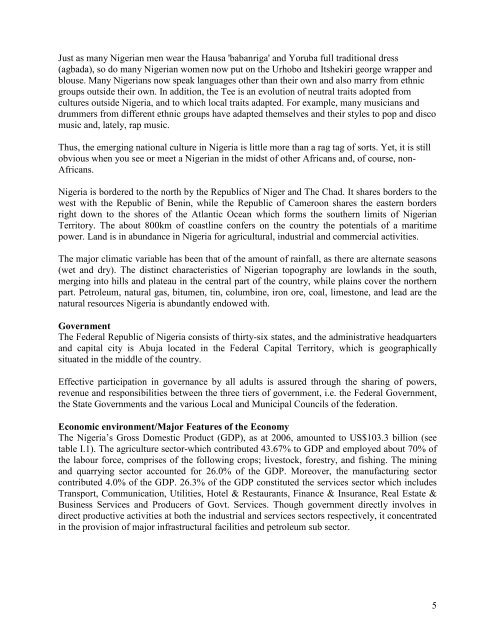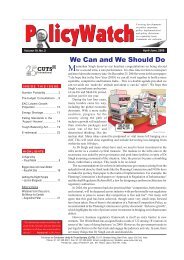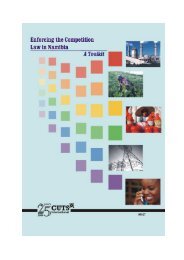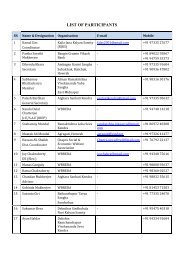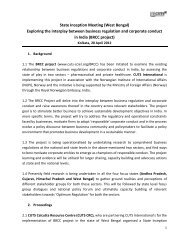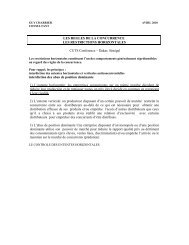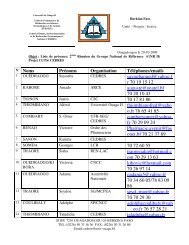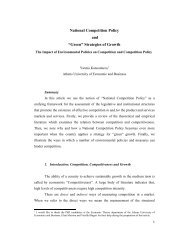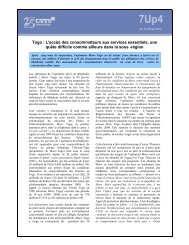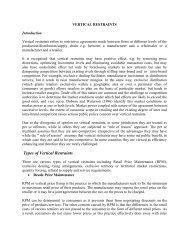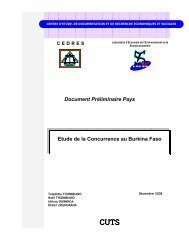COMPETITION REGIME SCENARIO IN NIGERIA - cuts ccier
COMPETITION REGIME SCENARIO IN NIGERIA - cuts ccier
COMPETITION REGIME SCENARIO IN NIGERIA - cuts ccier
You also want an ePaper? Increase the reach of your titles
YUMPU automatically turns print PDFs into web optimized ePapers that Google loves.
Just as many Nigerian men wear the Hausa 'babanriga' and Yoruba full traditional dress(agbada), so do many Nigerian women now put on the Urhobo and Itshekiri george wrapper andblouse. Many Nigerians now speak languages other than their own and also marry from ethnicgroups outside their own. In addition, the Tee is an evolution of neutral traits adopted fromcultures outside Nigeria, and to which local traits adapted. For example, many musicians anddrummers from different ethnic groups have adapted themselves and their styles to pop and discomusic and, lately, rap music.Thus, the emerging national culture in Nigeria is little more than a rag tag of sorts. Yet, it is stillobvious when you see or meet a Nigerian in the midst of other Africans and, of course, non-Africans.Nigeria is bordered to the north by the Republics of Niger and The Chad. It shares borders to thewest with the Republic of Benin, while the Republic of Cameroon shares the eastern bordersright down to the shores of the Atlantic Ocean which forms the southern limits of NigerianTerritory. The about 800km of coastline confers on the country the potentials of a maritimepower. Land is in abundance in Nigeria for agricultural, industrial and commercial activities.The major climatic variable has been that of the amount of rainfall, as there are alternate seasons(wet and dry). The distinct characteristics of Nigerian topography are lowlands in the south,merging into hills and plateau in the central part of the country, while plains cover the northernpart. Petroleum, natural gas, bitumen, tin, columbine, iron ore, coal, limestone, and lead are thenatural resources Nigeria is abundantly endowed with.GovernmentThe Federal Republic of Nigeria consists of thirty-six states, and the administrative headquartersand capital city is Abuja located in the Federal Capital Territory, which is geographicallysituated in the middle of the country.Effective participation in governance by all adults is assured through the sharing of powers,revenue and responsibilities between the three tiers of government, i.e. the Federal Government,the State Governments and the various Local and Municipal Councils of the federation.Economic environment/Major Features of the EconomyThe Nigeria’s Gross Domestic Product (GDP), as at 2006, amounted to US$103.3 billion (seetable I.1). The agriculture sector-which contributed 43.67% to GDP and employed about 70% ofthe labour force, comprises of the following crops; livestock, forestry, and fishing. The miningand quarrying sector accounted for 26.0% of the GDP. Moreover, the manufacturing sectorcontributed 4.0% of the GDP. 26.3% of the GDP constituted the services sector which includesTransport, Communication, Utilities, Hotel & Restaurants, Finance & Insurance, Real Estate &Business Services and Producers of Govt. Services. Though government directly involves indirect productive activities at both the industrial and services sectors respectively, it concentratedin the provision of major infrastructural facilities and petroleum sub sector.5


